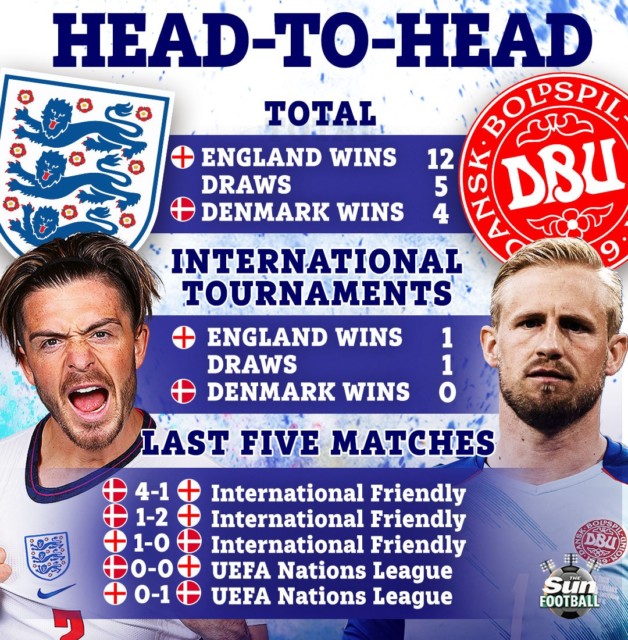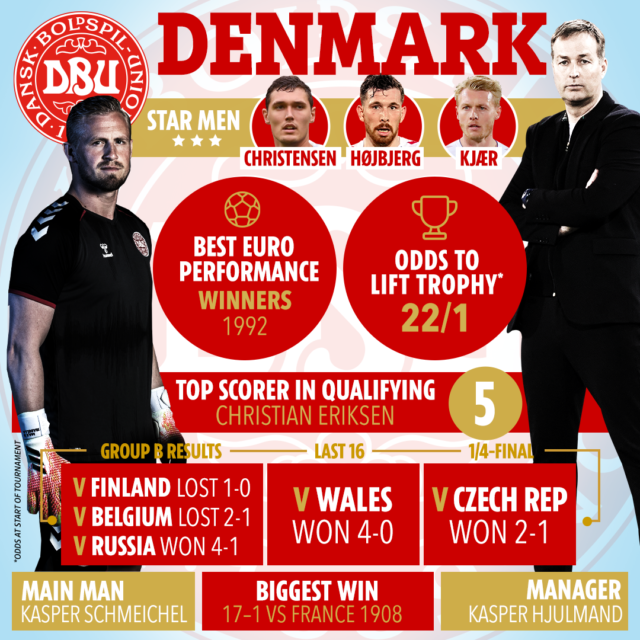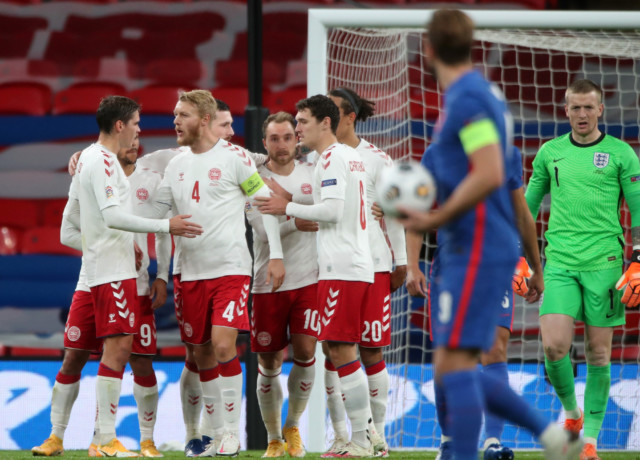DENMARK legend Morten Olsen kick-started their football revolution – with a rant in California.
The philosophy that helped shape the team England will face in tomorrow’s semi-final is known as The Red Thread.
But the Danes have a much more colourful word for the January 2004 outburst from Olsen that inspired it.
A ‘skideballe’ is literally a ‘s**tball’ and means a no-holds-barred b****ing.
Olsen, a hero as a player in the Danish Dynamite sides of the 1980s, was nearly four years into his reign as national coach – and had seen enough.
A Denmark B team, made up mainly of players from the domestic league, had just lost 3-1 to the USA at the Home Depot Center in Los Angeles.
Olsen raged: “We are producing too few good players.
“We’re not coaching well enough back home.
“Players don’t think fast enough, the quality of passing is poor and their agility is slow.
“This is enough to play in the Danish championship but not enough if we want to be at the top.”
Something was rotten in the state of Danish football, so Olsen and assistant Keld Bordinggaard took leading coaches to countryside retreats to brainstorm.
Among them was current national team boss Kasper Hjulmand, then the academy chief at Lyngby.
EURO 2020 FREE BETS: GET OVER £2,000 IN NEW CUSTOMER DEALS

Bordinggaard said: “There were remote locations where we would spend three or four days with a group of talented coaches.
“Kasper was one of the most significant ones but Thomas Frank, now at Brentford, was another and Johan Lange, now sporting director at Aston Villa.”
The Red Thread’s core principles for talent development were structured build-up, as opposed to the direct approach of coaches like Norway’s Egil Olsen; retention of possession; and front-foot defending-counter-pressing, rather than immediate retreat when possession was lost.
But not everyone agreed with the philosophy. Bordinggaard said: “Our ideas were not accepted. There was a lot of conflict, even inside the FA.
“It was regarded as naive. Some people thought if we wanted to challenge the big football nations, we would have to defend our way to the top.”
To some extent, that was the approach that had allowed Denmark to win Euro 92.
But Bordinggaard was also already working on a report to revolutionise the grassroots game and asked Hjulmand to assist him.
Their report, The New Way, was launched, like The Red Thread, in 2005.
Bordinggaard, now the technical director at Bayer Leverkusen, added: “It was a coherent programme where the kids had the ball more – smaller teams of three-a-side at the youngest age groups, smaller pitches, more learning opportunities.
“And then when the biggest talents arrived in the national youth teams, we would have a better foundation for the next steps.”

Critics of both approaches became more vocal after Denmark failed to get out of their group at the 2010 World Cup.
But the youngest player at the tournament was a certain Christian Eriksen, then 18 and a rising star at Ajax.
Soon players who had felt even more of the benefit of the new system were following Eriksen to big European clubs, with Pierre-Emile Hojbjerg going to Bayern Munich and Andreas Christensen joining Chelsea, both as teenagers.
Hojbjerg, now at Spurs, came through the ranks and in 2015, a year after his senior debut, he told Danish paper Politiken: “I want to say that I am proud to have gone through ‘Morten Olsen’s school’.
“Morten could have the opportunity to enjoy the fruits of what he has helped to plant.
“I am thinking of the players who are doing so well at foreign clubs and with the Under-21 national team… and who will very likely peak together in five or six years.
“I have even heard someone assess that in 2020 Denmark can have a national team that could be one of the best we have ever had.”
Hojbjerg was wrong about Olsen himself reaping the benefits.
The head coach stepped down in 2015 after failing to qualify for Euro 2016, having become just the second man in football history to play for AND manage his country in 100 matches.
But the Danes are now two games away from proving Hojbjerg and Olsen right about a Danish team peaking in 2020 or 2021.

 Read our Football live blog for the very latest news from around the grounds
Read our Football live blog for the very latest news from around the grounds
If the Euros had taken place last year, Norwegian boss Age Hareide would still have been in charge.
But the Danish FA went ahead with the pre-determined decision to appoint Hjulmand and their faith in him – and the philosophies he helped to shape – is being rewarded.
True to the principles of trusting youth that allowed him to lead Nordsjaelland to their only Danish title in 2012, 49-year-old Hjulmand has given the next generation of players a chance.
Defender Joakim Maehle, 24, has been a revelation since making his debut last September.
And the impressive 21-year-old forward Mikkel Damsgaard is one of four members of the squad who could have been at the delayed U-21s European Championship this year.
Denmark were also among the favourites for the European U-17 Championship that was cancelled last year.
So even if England beat Denmark tomorrow, The Red Thread is set to run for years to come.
Bordinggaard said: “I’m happy for Danish football.
“I’m happy club coaches bought into our ideas and we now have a national team that doesn’t just survive, it competes at a high level.”
COMPETITION: WIN A MERCEDES AMG A45S WORTH £51,000 PLUS UP TO £50k IN CASH

